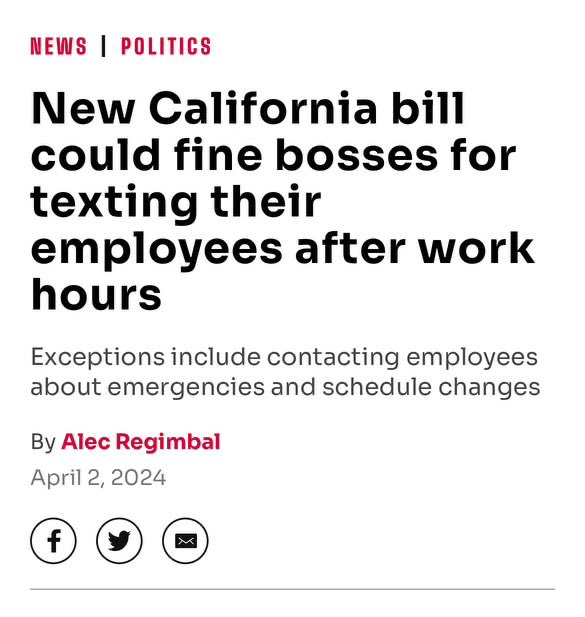MegaMaker - We need more calm companies
Older messages
Product Hunt – worth it?
Saturday, March 2, 2024
Remember when... Launching your product on Product Hunt (in the old days) could get you hundreds (or thousands) of new users. In his recent post, Tibo reflected: "When we launched Tweet Hunter
Do this first, 100x
Monday, February 19, 2024
Howdy! It's time for another SaaS marketing tip. When you're about to launch something new, your first step shouldn't be buying ads, optimizing for SEO, or posting on social media. One of
Is once enough?
Saturday, February 10, 2024
Howdy! Eight years ago, I wrote a piece asking: are we at peak SaaS? My thesis was that people were tired of paying subscriptions for software and that the SaaS market was ripe for disruption.* Late
A simple tip for user signups
Saturday, February 3, 2024
Howdy! A local company here in Vernon asked if I could go for coffee. They are in a bind: they need to increase revenue dramatically, or they won't be able to pay their operational expenses. They
I can't believe they chose us
Saturday, January 27, 2024
Howdy! I've been a huge fan of the Acquired podcast for a while. They do deep-dive episodes on the history of great companies: Nike, Costco, NFL, Nintendo. They're a big deal, with nearly a
You Might Also Like
AI agent ideas VCs want to see
Friday, February 28, 2025
+ ElevenLabs's new model; latest deals View in browser Box_flagship Good morning there, VCs have been champing at the bit to back AI agent startups this year. Less than two months into 2025 they
🗞 What's New: GPT-4.5 has arrived. Is it worth the $ for founders?
Friday, February 28, 2025
Also: Pieter Levels goes viral again ͏ ͏ ͏ ͏ ͏ ͏ ͏ ͏ ͏ ͏ ͏ ͏ ͏ ͏ ͏ ͏ ͏ ͏ ͏ ͏ ͏ ͏ ͏ ͏ ͏ ͏ ͏ ͏ ͏ ͏ ͏ ͏ ͏ ͏ ͏ ͏ ͏ ͏ ͏ ͏ ͏ ͏ ͏ ͏ ͏ ͏ ͏ ͏ ͏ ͏ ͏ ͏ ͏ ͏ ͏ ͏ ͏ ͏ ͏ ͏ ͏ ͏ ͏ ͏ ͏ ͏ ͏ ͏ ͏ ͏ ͏ ͏ ͏ ͏ ͏ ͏ ͏ ͏ ͏ ͏ ͏ ͏
SaaSHub Weekly - Feb 27
Thursday, February 27, 2025
SaaSHub Weekly - Feb 27 Featured and useful products Landing.so logo Landing.so Launch High Converting Landing Pages in Minutes with AI #Design Tools #Landing Pages #Landing Page Designer HOA Companion
The Complete Guide to SaaS Pricing Strategy
Thursday, February 27, 2025
Tomasz Tunguz Venture Capitalist If you were forwarded this newsletter, and you'd like to receive it in the future, subscribe here. The Complete Guide to SaaS Pricing Strategy Most startups play
46 new Shopify apps for you 🌟
Thursday, February 27, 2025
New Shopify apps hand-picked for you 🙌 Week 8 Feb 17, 2025 - Feb 24, 2025 New Shopify apps hand-picked for you 🙌 What's New at Shopify? 🌱 New dashboard in Shopify Fulfillment Network (SFN) Feature
Will YouTube kill podcasts?
Thursday, February 27, 2025
Hey, In the pursuit of "making podcasts more discoverable," the podcast industry has welcomed YouTube with open arms. However, I think we're underestimating YouTube. I think it's
🚀 Amazon’s New Alexa, GitHub Security Concerns & Growth Tools You Need!
Thursday, February 27, 2025
Amazon's Alexa just got smarter, GitHub's privacy issues exposed, and Nvidia posts strong earnings. Plus, top tools like Basalt and Zapier Agents, and expert guides on PPC budgeting and AI
[SaaS Club] From High Churn to Profitable ABM SaaS
Thursday, February 27, 2025
The SaaS Club Newsletter ⚡️ Presented by Designli Hey Reader Here's a quick round up of what's been going on at SaaS Club: In this week's newsletter: 🎧 How churn and tragedy led to SaaS
NEW: The Future of Open vs Closed AI Models
Thursday, February 27, 2025
thought you would be interested Hi there, I'm Isabelle, Senior Editor & Analyst at CB Insights. I thought you'd be interested in this new briefing that dives into the evolving landscape of
I can't believe it happened again.
Thursday, February 27, 2025
Read time: 1 min 27 sec Hey guys, It happened again. Another Starter Story clone shut down this week. The founder emailed me constantly, asking for advice. Then, when he finally pulled the plug, he


